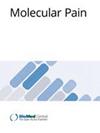MOTS-c is an effective target for treating streptozotocin induced painful diabetic neuropathy through induction of AMPK/PGC-1α -mediated mitochondrial biogenesis.
IF 2.8
3区 医学
Q2 NEUROSCIENCES
引用次数: 0
Abstract
Painful Diabetic Neuropathy (PDN) is a common diabetes complication that frequently causes severe hyperalgesia and allodynia and presents treatment challenges. MOTS-c, a novel mitochondrial-derived peptide, has been shown to regulate glucose metabolism, insulin sensitivity, and inflammatory responses. This study aimed to evaluate the effects of MOTS-c in streptozocin (STZ)-induced PDN model and investigate the putative underlying mechanisms. We found that endogenous MOTS-c levels in plasma and spinal dorsal horn were significantly lower in STZ-treated mice than in control animals. Accordingly, MOTS-c treatment significantly improves STZ-induced weight loss, elevation of blood glucose, mechanical allodynia, and thermal hyperalgesia; however, these effects were blocked by dorsomorphin, an AMPK inhibitor. In addition, MOTS-c treatment significantly enhanced AMPKα1/2 phosphorylation and PGC-1α expression in the lumbar spinal cord of PDN mice. Mechanistic studies indicated that MOTS-c significantly restored mitochondrial biogenesis, inhibited microglia activation, and decreased the production of pro-inflammatory factors, which contributed to the alleviation of pain. Moreover, MOTS-c decreased STZ-induced pain hypersensitivity in PDN mice by activating AMPK/PGC-1α signaling pathway. This provides the pharmacological and biological evidence for developing mitochondrial peptide-based therapeutic agents for PDN.通过诱导 AMPK/PGC-1α 介导的线粒体生物生成,MOTS-c 是治疗链脲佐菌素诱导的糖尿病痛性神经病变的有效靶点。
疼痛性糖尿病神经病变(PDN)是一种常见的糖尿病并发症,经常引起严重的痛觉减退和异动症,给治疗带来了挑战。MOTS-c是一种新型线粒体衍生肽,已被证明可以调节糖代谢、胰岛素敏感性和炎症反应。本研究旨在评估 MOTS-c 在链脲佐菌素(STZ)诱导的 PDN 模型中的作用,并研究其潜在的内在机制。我们发现,STZ 治疗小鼠血浆和脊髓背角的内源性 MOTS-c 水平明显低于对照组。因此,MOTS-c治疗能明显改善STZ诱导的体重减轻、血糖升高、机械异感和热痛。此外,MOTS-c 还能显著增强 PDN 小鼠腰脊髓中 AMPKα1/2 磷酸化和 PGC-1α 的表达。机理研究表明,MOTS-c 能明显恢复线粒体的生物生成,抑制小胶质细胞的活化,减少促炎因子的产生,从而缓解疼痛。此外,MOTS-c 还能通过激活 AMPK/PGC-1α 信号通路,降低 STZ 诱导的 PDN 小鼠痛觉过敏性。这为开发基于线粒体肽的 PDN 治疗药物提供了药理学和生物学证据。
本文章由计算机程序翻译,如有差异,请以英文原文为准。
求助全文
约1分钟内获得全文
求助全文
来源期刊

Molecular Pain
医学-神经科学
CiteScore
5.60
自引率
3.00%
发文量
56
审稿时长
6-12 weeks
期刊介绍:
Molecular Pain is a peer-reviewed, open access journal that considers manuscripts in pain research at the cellular, subcellular and molecular levels. Molecular Pain provides a forum for molecular pain scientists to communicate their research findings in a targeted manner to others in this important and growing field.
 求助内容:
求助内容: 应助结果提醒方式:
应助结果提醒方式:


